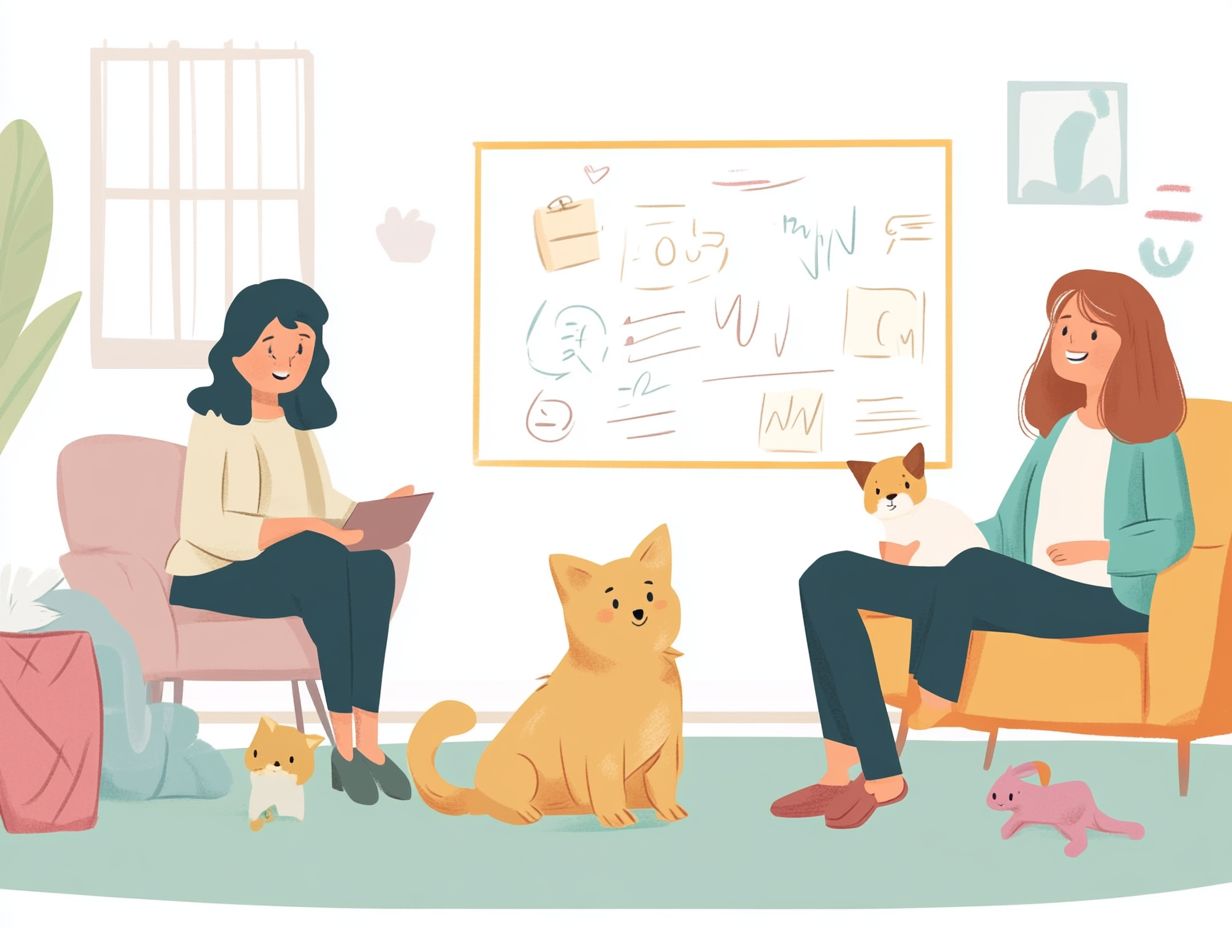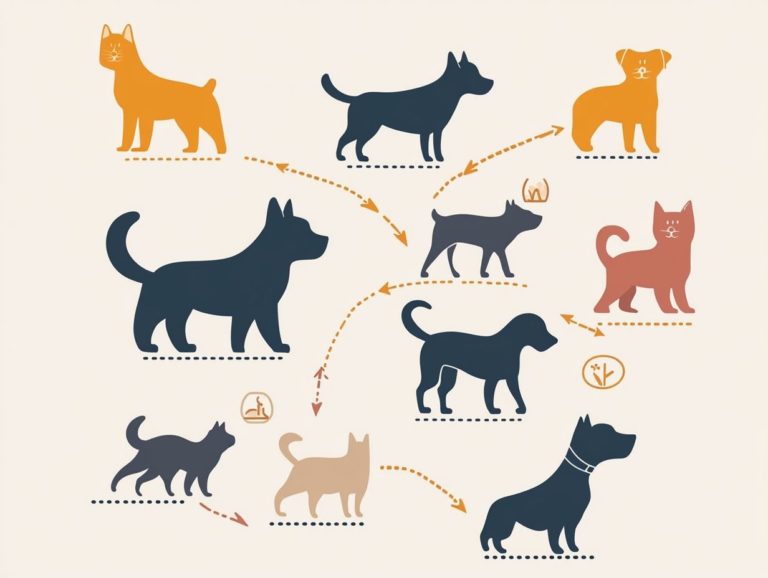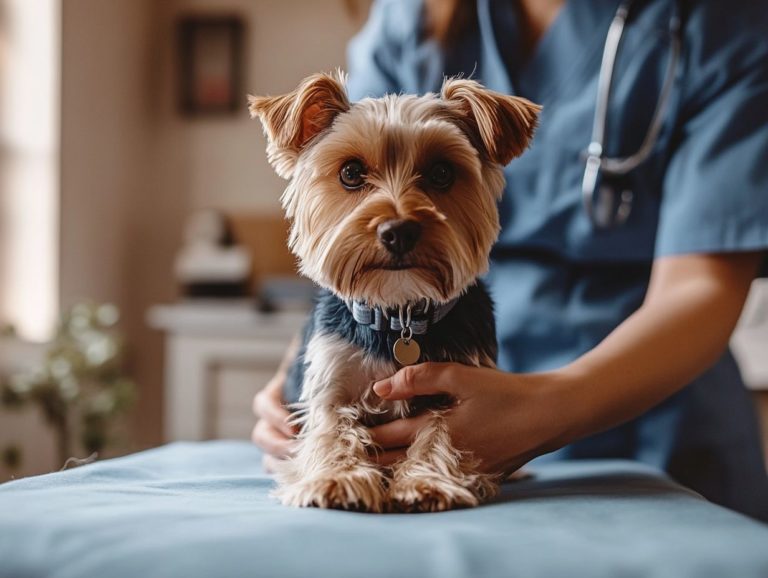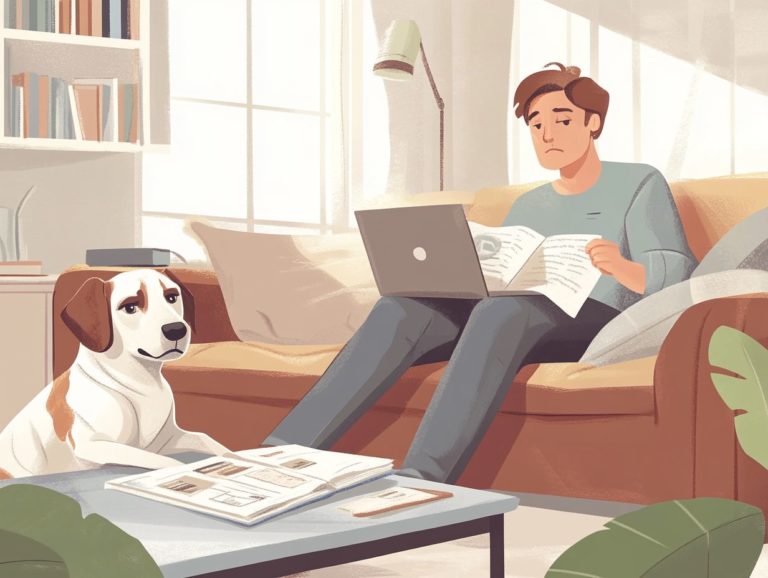Understanding Different Types of Pet Anxiety Experts
Pet anxiety is a growing concern for many pet owners. It can seriously affect the happiness of your furry friends.
From loud noises to changes in routine, many triggers can provoke stress and anxiety in pets. Understanding your pet’s anxiety can make a big difference in their happiness. It’s important to recognize the signs when they arise.
This guide connects you with veterinarians, animal behaviorists, and trainers who can help. You ll also discover effective treatment options and preventive measures to keep your beloved pet calm and content.
Contents
- Key Takeaways:
- What is Pet Anxiety?
- Types of Pet Anxiety Experts
- How to Choose the Right Expert for Your Pet
- Treatment Options for Pet Anxiety
- Medication
- Behavior Modification Techniques
- Preventing Pet Anxiety and Anxiety Prevention
- Frequently Asked Questions
- What are the different types of pet anxiety experts?
- What is the role of a veterinarian in treating pet anxiety?
- How can an animal behaviorist help with pet anxiety?
- What is the difference between a certified pet trainer and an animal behaviorist?
- Can holistic practitioners help with pet anxiety?
- Do I need to consult a licensed therapist for my pet’s anxiety?
Key Takeaways:

- Pet anxiety is a common issue that can affect the well-being of our furry friends.
- Veterinarians, animal behaviorists, and trainers can help you tackle your pet’s anxiety.
- When choosing an expert, consider their qualifications, experience, and approach to treatment.
What is Pet Anxiety?
Pet anxiety, especially in dogs, includes various emotional and behavioral challenges. As a pet owner, recognizing these signs is vital, as they may indicate underlying anxiety disorders. For more insight, check out understanding your pet’s anxiety: causes and solutions, which may require professional intervention and treatment.
Factors like separation anxiety, fear-related anxiety, and cognitive dysfunction syndrome declines in a pet’s mental abilities can significantly impact your dog’s behavior and overall well-being. The American Kennel Club (AKC) and veterinary professionals emphasize observing your dog’s body language and behaviors to identify anxiety-related issues effectively.
Defining Anxiety in Pets
To understand anxiety in pets, especially dogs, you need to explore the various causes that can trigger fear-related responses and troubling behaviors, including the effects of age on pet anxiety.
Triggers can include environmental stressors, such as loud thunder and fireworks, or changes in routine, like moving to a new home or adding a new family member.
Common symptoms of anxiety include excessive barking, destructive digging, pacing, or withdrawal from social interactions. For example, a dog fearful of thunderstorms might hide in a closet or tremble as the storm approaches.
Recognizing these signs is crucial since untreated anxiety can escalate into serious behavioral issues. For more insight, understanding pet anxiety and its long-term effects is important. Treatment often involves behavioral therapy, environmental modifications, and sometimes medication to provide relief and enhance your pet’s quality of life.
Types of Pet Anxiety Experts
When addressing dog anxiety, various pet anxiety experts play essential roles in diagnosing and treating these disorders. For a deeper understanding, resources on understanding pet anxiety in different species are invaluable. Veterinarians offer valuable insights into medical treatments, including anxiety medications like fluoxetine and clomipramine.
Animal behaviorists focus on the psychological aspects of anxiety, helping you understand your dog’s emotional landscape. Trainers focus on practical solutions through obedience training and behavior modification techniques, equipping you with tools to support your furry companion effectively.
Veterinarians
Veterinarians are critical for diagnosing and treating dog anxiety. They often refer to comprehensive resources like the Merck Veterinary Manual to identify the right anxiety medications for your furry friend.
They play a crucial role in recognizing symptoms of anxiety, such as vocalization, destructive behavior, and excessive pacing. By observing these behaviors closely, veterinarians can create informed treatment plans that may include various medications.
Among the options, CBD oil has gained popularity for its potential calming effects without the psychoactive drawbacks of THC. Traditional benzodiazepines may be recommended for more severe cases.
Ultimately, these veterinary professionals not only provide treatment solutions but also offer invaluable guidance to pet owners, helping you understand what makes a great pet anxiety specialist and manage your dog’s anxiety effectively.
Don t wait; start understanding your pet’s anxiety today!
Animal Behaviorists

Animal behaviorists analyze and modify dog behavior to help alleviate anxiety. They use effective techniques tailored to your dog’s unique needs.
The process starts with a thorough assessment. They observe your dog in different settings and gather detailed histories from you.
Based on this evaluation, they may use strategies like desensitization, which gently exposes your dog to anxiety triggers. They might also employ counter-conditioning to change your dog s emotional response using positive reinforcement.
Collaboration with veterinary professionals is important. They may recommend medical treatments alongside behavioral strategies.
Trainers
Trainers play a key role in reducing dog anxiety. They use professional training methods to address anxiety-related behaviors.
These experts understand that every dog has unique needs. They tailor their training techniques, such as positive reinforcement and structured socialization, to effectively reduce anxiety symptoms, including understanding the needs of anxious pets.
They incorporate deep-pressure strategies and calming exercises to help your dog feel secure. With patience and guidance, trainers instill confidence in your furry friend!
How to Choose the Right Expert for Your Pet
Selecting the ideal expert for your pet’s anxiety treatment is crucial, and it’s important to understand the cost of pet anxiety experts, requiring careful consideration of various factors.
Evaluate the specific type of anxiety your dog displays and consider understanding the anxiety spectrum in pets while assessing the qualifications and experience of the professional you choose.
Factors to Consider
When evaluating factors for treating your dog’s anxiety, assess their behavior and the severity of their anxiety symptoms.
Observing specific behaviors, like excessive barking or destructive tendencies, provides valuable insights into what your dog is experiencing.
Identifying whether the anxiety triggers are consistent or situational will help professionals tailor their approach to your dog’s needs.
Understanding the intensity of the symptoms can guide your decision between behavioral therapies and potential medication.
Selecting a qualified expert with relevant experience in dog anxiety, especially someone skilled in treatment methods like behavior modification, is crucial. It’s important to know when to consult a professional for pet anxiety to ensure that your dog receives the most appropriate care.
Treatment Options for Pet Anxiety
When addressing pet anxiety, you have various treatment options at your disposal. These include medications, behavior modification techniques, and natural therapies all carefully tailored to meet the unique needs of your dog.
Medication

Medication is essential in managing severe cases of dog anxiety. Options like fluoxetine, clomipramine, and benzodiazepines are frequently recommended by veterinarians.
These medications target various aspects of anxiety by adjusting brain chemicals in the brain, helping to foster a more balanced emotional state for your pet. Fluoxetine, a selective serotonin reuptake inhibitor (SSRI), not only alleviates anxiety but also tackles behavioral issues, making it a smart choice for long-term management.
Clomipramine, a tricyclic antidepressant, is particularly effective for dogs exhibiting obsessive-compulsive behaviors, while benzodiazepines provide quick relief during acute anxiety episodes.
It’s crucial to keep in mind that while these medications can offer significant benefits, they may also come with side effects like lethargy or gastrointestinal upset. By collaborating closely with a veterinarian, you can develop a tailored approach, integrating medication with behavioral therapy or training techniques to ensure a comprehensive strategy for addressing your dog’s anxiety.
Behavior Modification Techniques
Behavior modification techniques serve as essential tools in treating anxiety in dogs. They focus on transforming unwanted behaviors through expert training methods.
By implementing strategies like getting used to things that scare them, you can gradually expose your dog to anxiety-inducing stimuli in a controlled manner, allowing them to build tolerance over time.
Simultaneously, positive reinforcement encourages desirable behaviors by rewarding your dog for calm responses, fostering a sense of safety and security.
These techniques can be seamlessly integrated with any prescribed medication, creating a holistic approach to managing anxiety.
By combining these methods, you not only address the symptoms of anxiety but also cultivate a more confident and resilient canine companion, leading to a more harmonious living environment.
Preventing Pet Anxiety and Anxiety Prevention
Preventing pet anxiety is a proactive endeavor that requires you to implement effective strategies. Consider providing mental stimulation through engaging activities and incorporating calming music to foster a soothing environment for your beloved companion.
These strategies can greatly boost your pet’s happiness and comfort!
Tips for Reducing Stress and Anxiety in Pets
Implementing effective strategies for reducing stress and anxiety in pets can profoundly enhance their emotional well-being, particularly for rescue dogs that may have endured traumatic experiences.
By concentrating on creating a serene environment and establishing consistent routines, you can instill a sense of security in your furry companions.
Incorporating natural therapies, like aromatherapy with calming essential oils, further promotes relaxation. Regular exercise and interactive toys not only keep them physically engaged but also help manage anxiety levels.
Utilizing training techniques that emphasize positive reinforcement fosters trust and diminishes fear in anxious pets. You can also tap into resources such as local behavioral specialists and support groups for pet owners, providing invaluable guidance as you navigate these challenges.
Start today to give your pet the calm life they deserve!
Frequently Asked Questions
What are the different types of pet anxiety experts?

The different types of pet anxiety experts include:
- Veterinarians
- Animal behaviorists
- Certified pet trainers
- Holistic practitioners
- Licensed therapists
What is the role of a veterinarian in treating pet anxiety?
Veterinarians are trained to diagnose and treat medical conditions that may be causing or contributing to your pet’s anxiety. They may also prescribe medication or recommend other forms of treatment.
How can an animal behaviorist help with pet anxiety?
An animal behaviorist specializes in understanding and modifying animal behavior. They can work with your pet to identify triggers for their anxiety and develop a behavior modification plan to address it.
What is the difference between a certified pet trainer and an animal behaviorist?
A certified pet trainer focuses on training and obedience. An animal behaviorist understands and modifies behavior. Choosing the right professional can make a huge difference for your pet!
Can holistic practitioners help with pet anxiety?
Yes! Holistic practitioners use natural therapies like acupuncture, massage, and herbal remedies to reduce pet anxiety. They will work with you to create a treatment plan that promotes your pet’s overall well-being.
Do I need to consult a licensed therapist for my pet’s anxiety?
If your pet’s anxiety severely impacts their daily life, consulting a licensed therapist or psychologist is crucial. They offer counseling and behavior therapy for your pet, along with valuable support for you as the owner. Understanding key factors in understanding pet anxiety can also be beneficial in this process.






